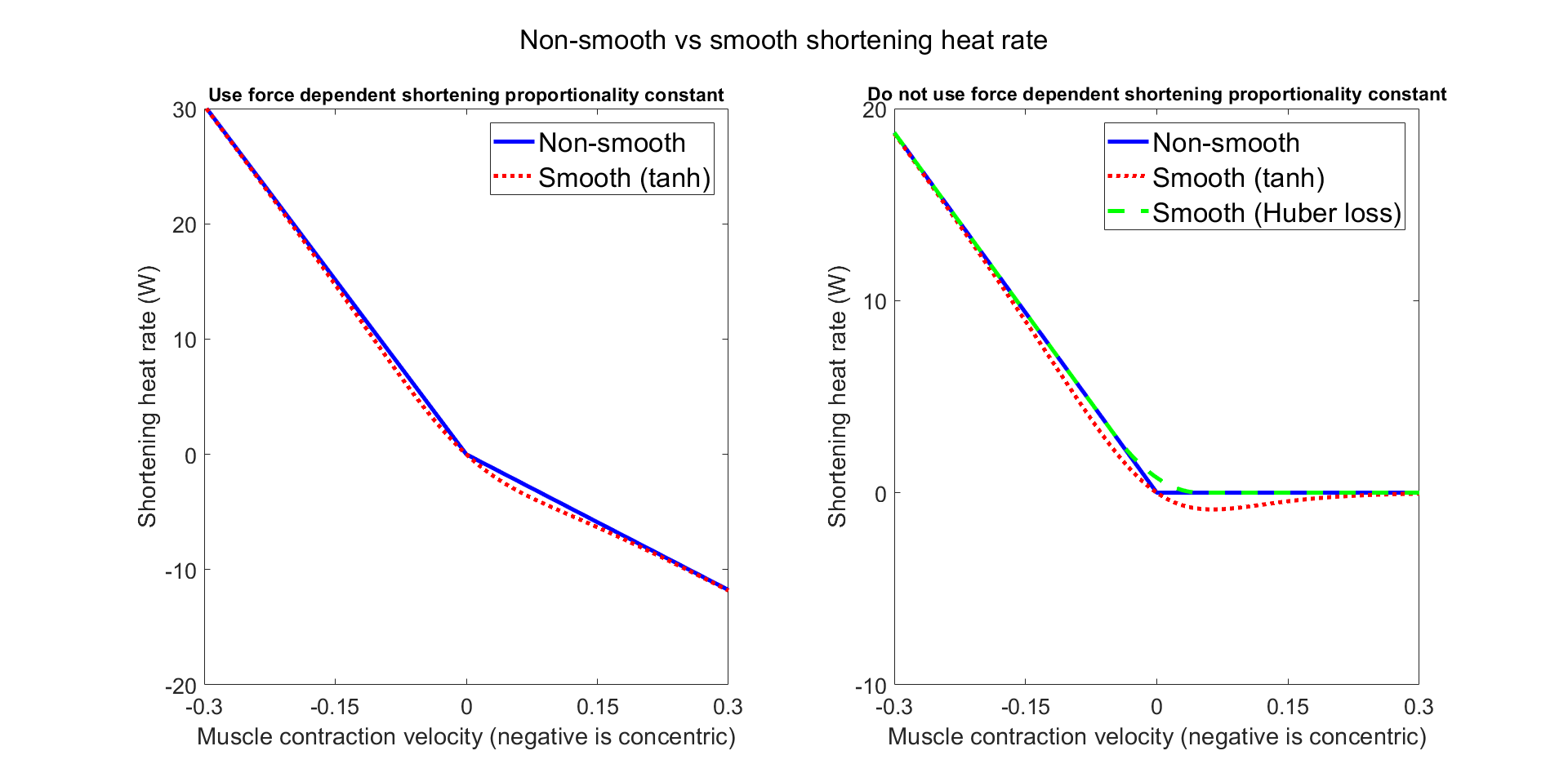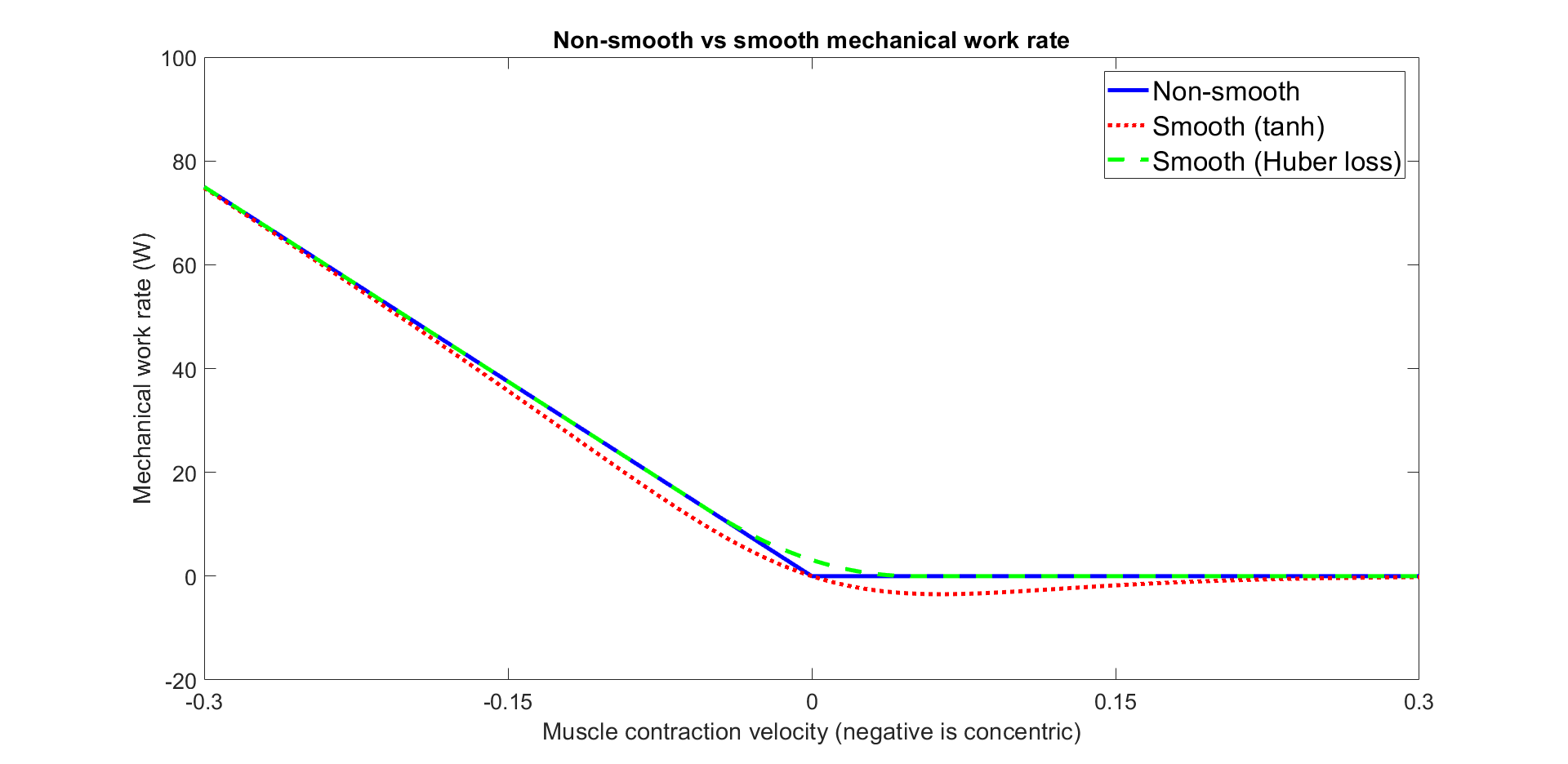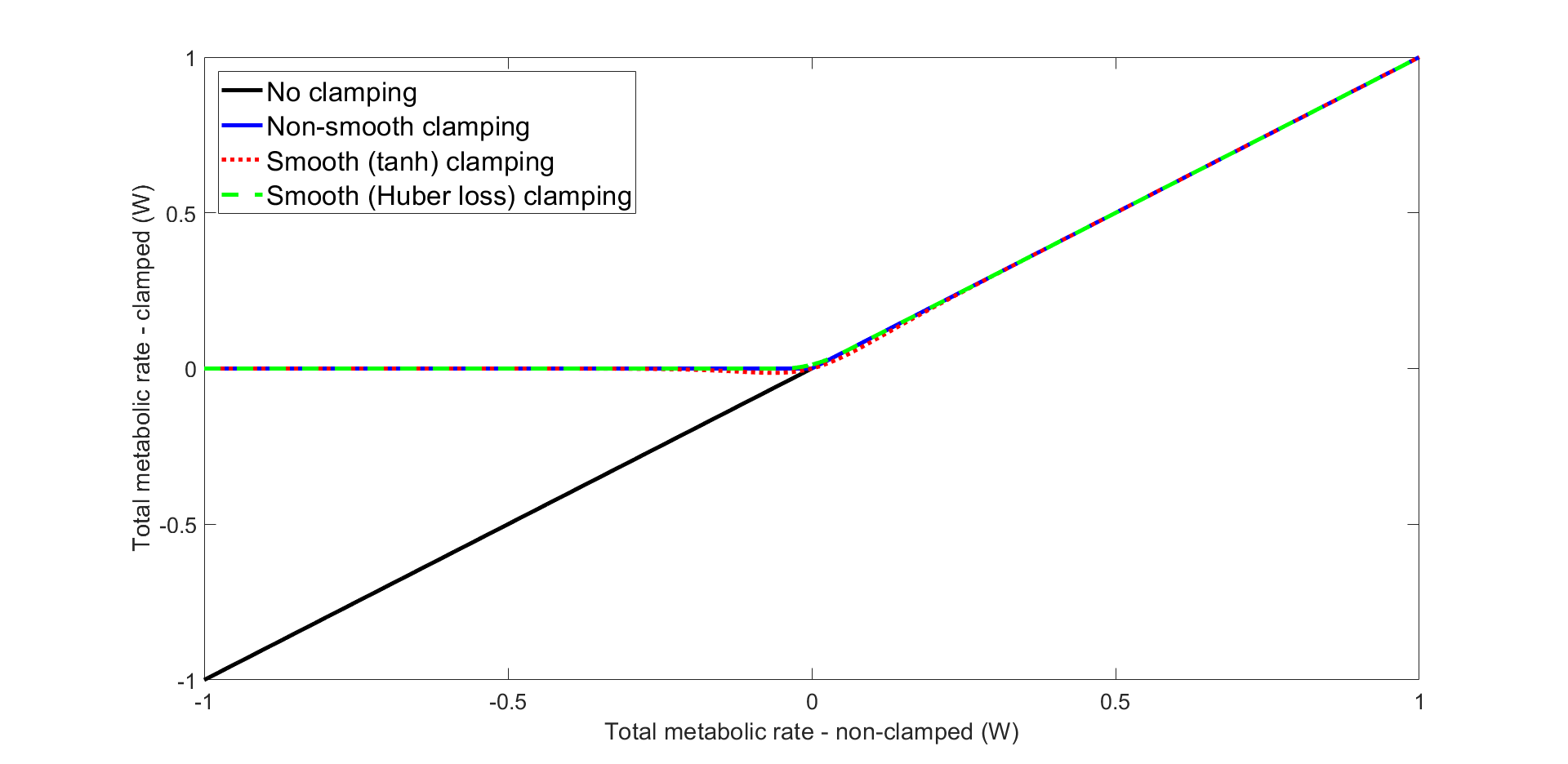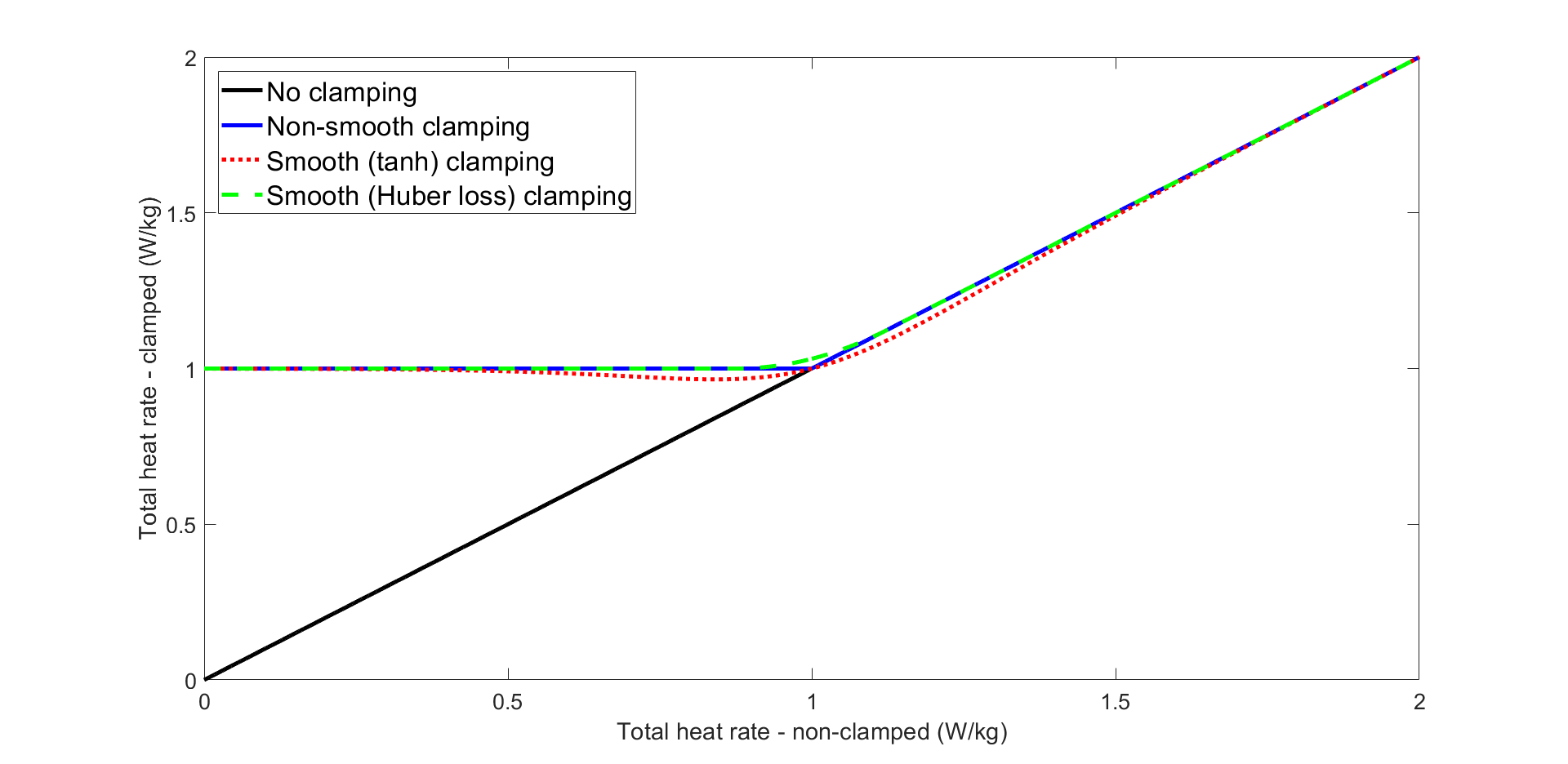 |
API
4.2
For MATLAB, Python, Java, and C++ users
|
 |
API
4.2
For MATLAB, Python, Java, and C++ users
|
This class implements the metabolic energy model of Bhargava et al (2004) and provides an option to use smooth (i.e., twice continuously differentiable) approximations. More...
 Inheritance diagram for OpenSim::Bhargava2004SmoothedMuscleMetabolics:
Inheritance diagram for OpenSim::Bhargava2004SmoothedMuscleMetabolics:Static Public Member Functions | |
Auto-generated functions | |
| static Bhargava2004SmoothedMuscleMetabolics * | safeDownCast (OpenSim::Object *obj) |
| For use in MATLAB and Python to access the concrete class. More... | |
 Static Public Member Functions inherited from OpenSim::ModelComponent Static Public Member Functions inherited from OpenSim::ModelComponent | |
| static ModelComponent * | safeDownCast (OpenSim::Object *obj) |
| For use in MATLAB and Python to access the concrete class. More... | |
| static const std::string & | getClassName () |
| This returns "ModelComponent" More... | |
 Static Public Member Functions inherited from OpenSim::Component Static Public Member Functions inherited from OpenSim::Component | |
| static Component * | safeDownCast (OpenSim::Object *obj) |
| For use in MATLAB and Python to access the concrete class. More... | |
| static const std::string & | getClassName () |
| This returns "Component" More... | |
 Static Public Member Functions inherited from OpenSim::Object Static Public Member Functions inherited from OpenSim::Object | |
| static void | registerType (const Object &defaultObject) |
| Register an instance of a class; if the class is already registered it will be replaced. More... | |
| static void | renameType (const std::string &oldTypeName, const std::string &newTypeName) |
| Support versioning by associating the current Object type with an old name. More... | |
| static const Object * | getDefaultInstanceOfType (const std::string &concreteClassName) |
| Return a pointer to the default instance of the registered (concrete) Object whose class name is given, or NULL if the type is not registered. More... | |
| template<class T > | |
| static bool | isObjectTypeDerivedFrom (const std::string &concreteClassName) |
| Return true if the given concrete object type represents a subclass of the template object type T, and thus could be referenced with a T*. More... | |
| static Object * | newInstanceOfType (const std::string &concreteClassName) |
| Create a new instance of the concrete Object type whose class name is given as concreteClassName. More... | |
| static void | getRegisteredTypenames (Array< std::string > &typeNames) |
| Retrieve all the typenames registered so far. More... | |
| template<class T > | |
| static void | getRegisteredObjectsOfGivenType (ArrayPtrs< T > &rArray) |
| Return an array of pointers to the default instances of all registered (concrete) Object types that derive from a given Object-derived type that does not have to be concrete. More... | |
| static bool | PrintPropertyInfo (std::ostream &os, const std::string &classNameDotPropertyName, bool printFlagInfo=true) |
| Dump formatted property information to a given output stream, useful for creating a "help" facility for registered objects. More... | |
| static bool | PrintPropertyInfo (std::ostream &os, const std::string &className, const std::string &propertyName, bool printFlagInfo=true) |
| Same as the other signature but the class name and property name are provided as two separate strings. More... | |
| static Object * | makeObjectFromFile (const std::string &fileName) |
| Create an OpenSim object whose type is based on the tag at the root node of the XML file passed in. More... | |
| static const std::string & | getClassName () |
| Return the name of this class as a string; i.e., "Object". More... | |
| static void | setSerializeAllDefaults (bool shouldSerializeDefaults) |
| Static function to control whether all registered objects and their properties are written to the defaults section of output files rather than only those values for which the default was explicitly overwritten when read in from an input file or set programmatically. More... | |
| static bool | getSerializeAllDefaults () |
| Report the value of the "serialize all defaults" flag. More... | |
| static bool | isKindOf (const char *type) |
| Returns true if the passed-in string is "Object"; each Object-derived class defines a method of this name for its own class name. More... | |
| static void | setDebugLevel (int newLevel) |
| Set the amount of logging output. More... | |
| static int | getDebugLevel () |
| Get the current setting of debug level. More... | |
| static Object * | SafeCopy (const Object *aObject) |
| Use the clone() method to duplicate the given object unless the pointer is null in which case null is returned. More... | |
| static void | RegisterType (const Object &defaultObject) |
| OBSOLETE alternate name for registerType(). More... | |
| static void | RenameType (const std::string &oldName, const std::string &newName) |
| OBSOLETE alternate name for renameType(). More... | |
Auto-generated functions <br> | |
| static const std::string & | getClassName () |
| This returns "Bhargava2004SmoothedMuscleMetabolics" More... | |
| Bhargava2004SmoothedMuscleMetabolics * | clone () const override |
| Create a new heap-allocated copy of the concrete object to which this Object refers. More... | |
| const std::string & | getConcreteClassName () const override |
| Returns the class name of the concrete Object-derived class of the actual object referenced by this Object, as a string. More... | |
Additional Inherited Members | |
 Public Member Functions inherited from OpenSim::ModelComponent Public Member Functions inherited from OpenSim::ModelComponent | |
| ModelComponent () | |
| Default constructor. More... | |
| ModelComponent (const std::string &aFileName, bool aUpdateFromXMLNode=true) | |
| Construct ModelComponent from an XML file. More... | |
| ModelComponent (SimTK::Xml::Element &aNode) | |
| Construct ModelComponent from a specific node in an XML document. More... | |
| virtual | ~ModelComponent () |
| Destructor is virtual to allow concrete model component cleanup. More... | |
| void | connectToModel (Model &model) |
| Connect this ModelComponent to its aggregate- a Model. More... | |
| const Model & | getModel () const |
| Get a const reference to the Model this component is part of. More... | |
| Model & | updModel () |
| Get a modifiable reference to the Model this component is part of. More... | |
| bool | hasModel () const |
| Does this ModelComponent have a Model associated with it? More... | |
| void | preScale (const SimTK::State &s, const ScaleSet &scaleSet) |
| Perform any computations that must occur before ModelComponent::scale() is invoked on all ModelComponents in the Model. More... | |
| void | scale (const SimTK::State &s, const ScaleSet &scaleSet) |
| Scale the ModelComponent. More... | |
| void | postScale (const SimTK::State &s, const ScaleSet &scaleSet) |
| Perform any computations that must occur after ModelComponent::scale() has been invoked on all ModelComponents in the Model. More... | |
 Public Member Functions inherited from OpenSim::Component Public Member Functions inherited from OpenSim::Component | |
 Public Member Functions inherited from OpenSim::Object Public Member Functions inherited from OpenSim::Object | |
| virtual | ~Object () |
| Virtual destructor for cleanup. More... | |
| bool | isEqualTo (const Object &aObject) const |
| Equality operator wrapper for use from languages not supporting operator overloading. More... | |
| Object & | operator= (const Object &aObject) |
| Copy assignment copies he base class fields, including the properties. More... | |
| virtual bool | operator== (const Object &aObject) const |
| Determine if two objects are equal. More... | |
| virtual bool | operator< (const Object &aObject) const |
| Provide an ordering for objects so they can be put in sorted containers. More... | |
| void | setName (const std::string &name) |
| Set the name of the Object. More... | |
| const std::string & | getName () const |
| Get the name of this Object. More... | |
| void | setDescription (const std::string &description) |
| Set description, a one-liner summary. More... | |
| const std::string & | getDescription () const |
| Get description, a one-liner summary. More... | |
| const std::string & | getAuthors () const |
| Get Authors of this Object. More... | |
| void | setAuthors (const std::string &authors) |
| Set Authors of this object. More... | |
| const std::string & | getReferences () const |
| Get references or publications to cite if using this object. More... | |
| void | setReferences (const std::string &references) |
| Set references or publications to cite if using this object. More... | |
| int | getNumProperties () const |
| Determine how many properties are stored with this Object. More... | |
| const AbstractProperty & | getPropertyByIndex (int propertyIndex) const |
| Get a const reference to a property by its index number, returned as an AbstractProperty. More... | |
| AbstractProperty & | updPropertyByIndex (int propertyIndex) |
| Get a writable reference to a property by its index number, returned as an AbstractProperty. More... | |
| bool | hasProperty (const std::string &name) const |
| Return true if this Object has a property of any type with the given name, which must not be empty. More... | |
| const AbstractProperty & | getPropertyByName (const std::string &name) const |
| Get a const reference to a property by its name, returned as an AbstractProperty. More... | |
| AbstractProperty & | updPropertyByName (const std::string &name) |
| Get a writable reference to a property by its name, returned as an AbstractProperty. More... | |
| template<class T > | |
| bool | hasProperty () const |
| Return true if this Object contains an unnamed, one-object property that contains objects of the given template type T. More... | |
| template<class T > | |
| const Property< T > & | getProperty (const PropertyIndex &index) const |
| Get property of known type Property<T> as a const reference; the property must be present and have the right type. More... | |
| template<class T > | |
| Property< T > & | updProperty (const PropertyIndex &index) |
| Get property of known type Property<T> as a writable reference; the property must be present and have the right type. More... | |
| bool | isObjectUpToDateWithProperties () const |
Returns true if no property's value has changed since the last time setObjectIsUpToDateWithProperties() was called. More... | |
| void | readObjectFromXMLNodeOrFile (SimTK::Xml::Element &objectElement, int versionNumber) |
| We're given an XML element from which we are to populate this Object. More... | |
| void | updateXMLNode (SimTK::Xml::Element &parent, const AbstractProperty *prop=nullptr) const |
| Serialize this object into the XML node that represents it. More... | |
| bool | getInlined () const |
| Inlined means an in-memory Object that is not associated with an XMLDocument. More... | |
| void | setInlined (bool aInlined, const std::string &aFileName="") |
| Mark this as inlined or not and optionally provide a file name to associate with the new XMLDocument for the non-inline case. More... | |
| std::string | getDocumentFileName () const |
| If there is a document associated with this object then return the file name maintained by the document. More... | |
| int | getDocumentFileVersion () const |
| If there is a document associated with this object then return its version number. More... | |
| void | setAllPropertiesUseDefault (bool aUseDefault) |
| bool | print (const std::string &fileName) const |
| Write this Object into an XML file of the given name; conventionally the suffix to use is ".osim". More... | |
| std::string | dump () const |
| dump the XML representation of this Object into an std::string and return it. More... | |
| virtual bool | isA (const char *type) const |
| The default implementation returns true only if the supplied string is "Object"; each Object-derived class overrides this to match its own class name. More... | |
| const std::string & | toString () const |
| Wrapper to be used on Java side to display objects in tree; this returns just the object's name. More... | |
| PropertySet & | getPropertySet () |
| OBSOLETE: Get a reference to the PropertySet maintained by the Object. More... | |
| const PropertySet & | getPropertySet () const |
This class implements the metabolic energy model of Bhargava et al (2004) and provides an option to use smooth (i.e., twice continuously differentiable) approximations.
These approximations might be better suited for gradient-based optimization algorithms.
We propose two smooth implementations.
In the first implementation, conditional if statements were approximated by using hyperbolic tangent functions (tanh). For example, the following if statement:
y = a, if x <= d
y = b, if x > d
can be approximated by:
f = 0.5 + 0.5 tanh(b(x-d))
y = a + (-a + b) f
where b is a parameter that determines the smoothness of the transition.
In the second implementation, conditional if statements were approximated by using Huber loss functions, which have the following form:
L(f(x)) = 0.5 f(x)^2, if f(x) <= delta
L(f(x)) = delta(f(x) - 0.5 delta), otherwise.
The Huber loss function is quadratic for f(x) <= delta and linear otherwise, with equal value and slopes of the different sections at the points where f(x) = delta (https://en.wikipedia.org/wiki/Huber_loss). In our implementation, we scaled this function with a parameter b that determines the smootheness of the transition between the quadratic and linear parts. Note that this approximation is piecewise but still continuous.
The metabolic energy model includes components for activation heat rate, maintenance heat rate, shortening heat rate, and mechanical work rate.
The shortening heat rate model differs between concentric contractions and eccentric contractions. We smoothed the transition between both contraction types using our smoothing functions. Note that when using the force dependent shortening proportional constant, we only provide the tanh smoothing option for approximating the shortening heat rate. This is motivated by the fact that the shortening heat rate is defined by linear functions but with different non-zero constants of proportionality for concentric and eccentric contractions. It is therefore easier to smooth the transition between both contraction types with a tanh function than with a Huber loss function. The difference between the original (non-smooth) and the smooth implementations is illustrated in the following figure:

The mechanical work rate model includes negative mechanical work rate (i.e., work rate resulting from eccentric contraction) by default. However, if specified by the user, the model only takes positive mechanical work rate (i.e., work rate resulting from concentric contraction) into account. In such case, we smoothed the transition between positive rate and zero using our smoothing functions. The difference between the original (non-smooth) and the smooth implementations is illustrated in the following figure:

The metabolic energy model implementation includes an optional clamping that prevents the total metabolic rate (i.e., total metabolic power) to be negative. This clamping is done by increasing the shortening heat rate. We smoothed the transition between positive and negative total metabolic rate using our smoothing functions. The difference between the original (non-smooth) and the smooth implementations is illustrated in the following figure:

The metabolic energy model implementation includes an optional clamping (see Umberger et al (2003), page 104) that prevents the total heat rate (i.e., activation heat rate + maintenance heat rate + shortening heat rate) for a given muscle to fall below 1.0 W/kg. Note that, if active, this clamping will cause the sum of the reported individual heat rates and work rate to differ from the reported metabolic rate. We smoothed the transition between total heat rate higher and lower than 1.0 W/kg using our smoothing functions. The difference between the original (non-smooth) and the smooth implementations is illustrated in the following figure:

Note that the maintenance heat rate implementation relies on a PiecewiseLinearFunction. The first and second order derivatives of this function can be evaluated but they are discontinuous. This might cause issues with gradient-based optimization algorithms. Problems using this discontinuous function have successfully converged; therefore, we have included it in this implementation of the model.
You can enable smoothing via the use_smoothing property. The smoothing type ('tanh' or 'huber') can be chosen via the smoothing_type property, and the level of smoothing can be controlled by the velocity_smoothing, power_smoothing, and heat_rate_smoothing properties.
Muscles to be included when computing the total metabolic rate should be specified using one of the three addMuscle() function overloads. See the properties of Bhargava2004SmoothedMuscleMetabolics_MuscleParameters() for the default parameter values used when not specified via the second or third addMuscle() overload.
The total metabolic rate output can be obtained using getTotalMetabolicRate(), which takes a SimTK::State as a argument. You can similarly obtain the individual heat rate and mechanical work rate components of the total metabolic cost via getTotalActivationRate(), getTotalMaintenanceRate(), getTotalShorteningRate(), and getTotalMechanicalWorkRate(). All outputs require realizing the passed SimTK::State to SimTK::Stage::Dynamics.
Bhargava et al. 2004: https://doi.org/10.1016/s0021-9290(03)00239-2
|
inlineoverridevirtual |
Create a new heap-allocated copy of the concrete object to which this Object refers.
It is up to the caller to delete the returned object when no longer needed. Every concrete object deriving from Object implements this pure virtual method automatically, via the declaration macro it invokes (e.g., OpenSim_DECLARE_CONCRETE_OBJECT()). Note that the concrete class overrides modify the return type to be a pointer to the concrete object; that still overrides the base class method because the return type is covariant with (that is, derives from) Object.
Implements OpenSim::ModelComponent.
|
inlinestatic |
This returns "Bhargava2004SmoothedMuscleMetabolics"
See getConcreteClassName() if you want the class name of the underlying concrete object instead.
|
inlineoverridevirtual |
Returns the class name of the concrete Object-derived class of the actual object referenced by this Object, as a string.
This is the string that is used as the tag for this concrete object in an XML file. Every concrete class derived from Object automatically overrides this method via the declaration macro it uses. See getClassName() to get the class name of the referencing (possibly abstract) class rather than the concrete object.
Implements OpenSim::ModelComponent.
|
inlinestatic |
For use in MATLAB and Python to access the concrete class.
Example: cObj = Bhargava2004SmoothedMuscleMetabolics.safeDownCast(obj). This is equivalent to dynamic_cast<Bhargava2004SmoothedMuscleMetabolics*>(obj) in C++.